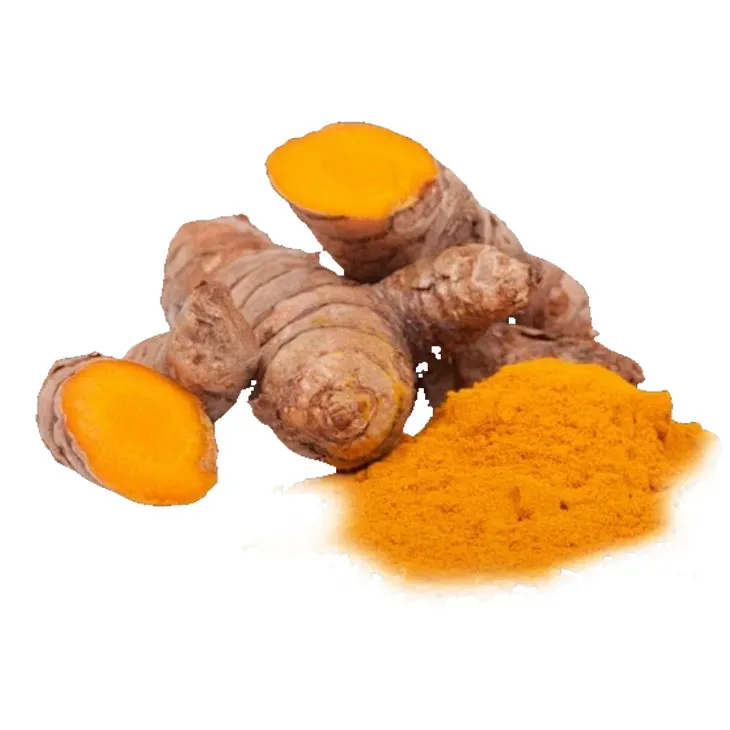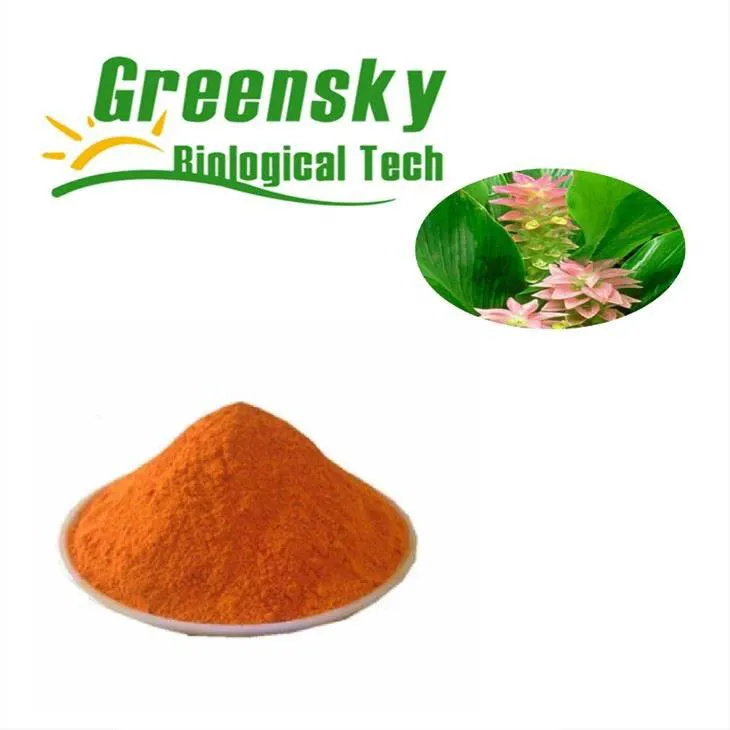- 0086-571-85302990
- sales@greenskybio.com
All the benefits of curcumin.
2024-11-13

Introduction
Curcumin is a compound that has been the focus of numerous scientific studies in recent years. It is the main active ingredient in turmeric, a spice that has been used for centuries in traditional medicine, particularly in Asian cultures. The diverse range of benefits associated with Curcumin is truly remarkable, and this article will explore them in detail.

Anti - Inflammatory Properties
1. Inflammation in the Body
Inflammation is a natural response of the body's immune system to injury or infection. However, chronic inflammation can lead to a host of health problems, such as arthritis, heart disease, and diabetes. Curcumin has been shown to have powerful anti - inflammatory effects, which can help to reduce the risk of these and other inflammatory - related conditions.
2. How Curcumin Reduces Inflammation
Curcumin works by inhibiting certain enzymes and proteins in the body that are involved in the inflammatory response. For example, it can block the activity of cyclooxygenase - 2 (COX - 2), an enzyme that is responsible for producing prostaglandins, which are mediators of inflammation. By reducing the production of these inflammatory mediators, curcumin can help to alleviate pain, swelling, and redness associated with inflammation.
3. Clinical Evidence
There have been several clinical studies that have demonstrated the anti - inflammatory benefits of curcumin. In one study, patients with rheumatoid arthritis who were given curcumin supplements showed significant improvement in their symptoms, including reduced pain and joint swelling. Another study found that curcumin was effective in reducing inflammation in patients with inflammatory bowel disease.

Antioxidant Activity
1. Oxidative Stress and Its Effects
Oxidative stress occurs when there is an imbalance between the production of reactive oxygen species (ROS) and the body's ability to neutralize them with antioxidants. ROS can damage cells, proteins, and DNA, which can lead to aging, cancer, and other diseases. Curcumin is a potent antioxidant, which means it can help to protect the body from the harmful effects of oxidative stress.
2. How Curcumin Acts as an Antioxidant
Curcumin has the ability to scavenge free radicals, which are highly reactive molecules that can cause oxidative damage. It also has the capacity to upregulate the body's own antioxidant defense systems, such as increasing the activity of superoxide dismutase (SOD) and glutathione peroxidase (GPx). These enzymes play a crucial role in neutralizing ROS and maintaining cellular health.
3. Benefits in Preventing Oxidative - Related Diseases
By reducing oxidative stress, curcumin may have a protective effect against a variety of diseases. For example, it may help to prevent cardiovascular disease by reducing the oxidation of low - density lipoprotein (LDL) cholesterol, which is a major risk factor for heart disease. It may also play a role in preventing neurodegenerative diseases such as Alzheimer's and Parkinson's, as oxidative damage to the brain is thought to be involved in the development of these conditions.

Anti - Cancer Potential
1. Cancer Prevention
There is growing evidence to suggest that curcumin may have a role in cancer prevention. It can interfere with various stages of cancer development, including initiation, promotion, and progression. For example, curcumin can inhibit the activation of carcinogens, which are substances that can cause cancer. It can also modulate the activity of certain genes and proteins that are involved in cell growth and division, thereby preventing the abnormal proliferation of cells that can lead to cancer.
2. Anti - Cancer Mechanisms
Curcumin exerts its anti - cancer effects through multiple mechanisms. One of the main mechanisms is its ability to induce apoptosis, or programmed cell death, in cancer cells. This is important because cancer cells often have the ability to evade normal cell death processes, which allows them to continue to grow and spread. Curcumin can also inhibit angiogenesis, the process by which new blood vessels are formed to supply nutrients to tumors. Without a blood supply, tumors cannot grow beyond a certain size.
3. Research and Clinical Trials
Several in - vitro and in - vivo studies have shown the anti - cancer properties of curcumin. In vitro studies have demonstrated that curcumin can inhibit the growth of various cancer cell lines, including breast, colon, and lung cancer cells. In vivo studies in animal models have also shown that curcumin can reduce tumor growth and metastasis. However, more clinical trials are needed to fully understand the potential of curcumin as a cancer treatment.

Immune - Boosting Effects
1. The Immune System and Health
The immune system is responsible for protecting the body from foreign invaders such as bacteria, viruses, and fungi. A strong immune system is essential for good health, as it can help to prevent infections and diseases. Curcumin has been shown to enhance the immune system, which can help the body to fight off infections more effectively.
2. How Curcumin Boosts the Immune System
Curcumin can modulate the activity of immune cells such as macrophages, T - cells, and B - cells. Macrophages are white blood cells that play a key role in the immune response by engulfing and destroying foreign pathogens. Curcumin can enhance the phagocytic activity of macrophages, making them more effective at clearing infections. It can also regulate the activity of T - cells and B - cells, which are involved in the adaptive immune response and play a crucial role in developing immunity to specific pathogens.
3. Applications in Preventing and Treating Infections
Due to its immune - boosting effects, curcumin may have potential applications in preventing and treating infections. For example, it may be useful in preventing respiratory infections such as the common cold and flu. It may also have a role in treating chronic infections such as hepatitis and tuberculosis, although more research is needed in these areas.

Other Potential Benefits
1. Digestive Health
Curcumin may have beneficial effects on digestive health. It can help to improve digestion by increasing the production of bile, which is essential for the breakdown and absorption of fats. It may also have a role in treating digestive disorders such as indigestion, bloating, and irritable bowel syndrome (IBS). Some studies have shown that curcumin can reduce the symptoms of IBS, such as abdominal pain and diarrhea.
2. Brain Health
In addition to its potential role in preventing neurodegenerative diseases, curcumin may also have other benefits for brain health. It may improve cognitive function, including memory and attention. Some studies have suggested that curcumin can enhance the production of brain - derived neurotrophic factor (BDNF), which is a protein that plays a key role in the growth, survival, and differentiation of neurons.
3. Skin Health
Curcumin may also be beneficial for skin health. It has anti - inflammatory and antioxidant properties, which can help to protect the skin from damage caused by environmental factors such as UV radiation and pollution. It may also have a role in treating skin conditions such as acne, psoriasis, and eczema. For example, curcumin can reduce the inflammation associated with acne and psoriasis, leading to improved skin appearance.
Conclusion
In conclusion, curcumin is a compound with a wide range of potential benefits. Its anti - inflammatory, antioxidant, anti - cancer, and immune - boosting properties make it a promising candidate for the prevention and treatment of various diseases. However, more research is needed to fully understand the mechanisms of action of curcumin and to develop effective therapeutic strategies. Despite this, the existing evidence suggests that incorporating curcumin - rich foods such as turmeric into the diet or taking curcumin supplements may be a beneficial addition to a healthy lifestyle.
FAQ:
What is the main anti - inflammatory mechanism of curcumin?
Curcumin exerts its anti - inflammatory effects through multiple pathways. It can inhibit the activation of various inflammatory mediators such as cytokines and enzymes. For example, it may suppress the production of TNF - α (tumor necrosis factor - alpha) and interleukin - 1β, which are key players in the inflammatory process. Additionally, curcumin can modulate the activity of transcription factors involved in inflammation, like NF - κB (nuclear factor kappa - B), thereby reducing the expression of many pro - inflammatory genes.
How does curcumin act as an antioxidant?
As an antioxidant, curcumin has the ability to neutralize free radicals. Free radicals are unstable molecules that can cause oxidative damage to cells. Curcumin donates electrons to these free radicals, thereby stabilizing them and preventing them from causing harm. It can also upregulate the body's own antioxidant defense mechanisms, for instance, by increasing the activity of antioxidant enzymes such as superoxide dismutase and glutathione peroxidase.
What types of cancers may curcumin be effective against?
Research has suggested that curcumin may have potential in preventing and treating several types of cancers. For colon cancer, it may interfere with the growth and proliferation of cancer cells by modulating various signaling pathways. In breast cancer, curcumin has been shown to have anti - estrogenic effects, which can be beneficial in estrogen - receptor - positive breast cancers. It also shows promise in pancreatic cancer, where it may inhibit cancer cell invasion and metastasis. However, more research is still needed to fully understand its effectiveness and potential applications in cancer treatment.
How does curcumin enhance the immune system?
Curcumin can enhance the immune system in multiple ways. It can stimulate the production and function of immune cells such as macrophages, which are important for engulfing and destroying pathogens. It also modulates the activity of lymphocytes, including T - cells and B - cells, which play crucial roles in adaptive immunity. Moreover, curcumin can regulate the balance of the immune response, preventing excessive inflammation while maintaining an effective defense against infections.
Can curcumin be used as a sole treatment for any diseases?
Currently, curcumin is not typically used as a sole treatment for diseases. While it has shown great potential in various aspects such as anti - inflammation, antioxidant, anti - cancer, and immune enhancement, more research is needed to establish it as a stand - alone treatment. In most cases, it may be used as a complementary or adjunct therapy. For example, in cancer treatment, it may be combined with traditional chemotherapy or radiotherapy to enhance the overall effectiveness and reduce side effects.
Related literature
- The Therapeutic Potential of Curcumin in Inflammatory Diseases"
- "Curcumin as an Antioxidant: From Chemistry to Clinical Applications"
- "Curcumin and Cancer: A Review of Preclinical and Clinical Research"
- "The Role of Curcumin in Boosting the Immune System"
- ▶ Hesperidin
- ▶ citrus bioflavonoids
- ▶ plant extract
- ▶ lycopene
- ▶ Diosmin
- ▶ Grape seed extract
- ▶ Sea buckthorn Juice Powder
- ▶ Beetroot powder
- ▶ Hops Extract
- ▶ Artichoke Extract
- ▶ Reishi mushroom extract
- ▶ Astaxanthin
- ▶ Green Tea Extract
- ▶ Curcumin Extract
- ▶ Horse Chestnut Extract
- ▶ Other Problems
- ▶ Boswellia Serrata Extract
- ▶ Resveratrol Extract
- ▶ Marigold Extract
- ▶ Grape Leaf Extract
- ▶ blog3
- ▶ blog4
- ▶ blog5
-
Organic Tongkat Ali extract powder factory.
2024-11-13
-
How to make powder with ashwagandha extract.
2024-11-13
-
Rosehip extract manufacturers from China.
2024-11-13
-
The best cat's claw extract in nature.
2024-11-13
-
Chinese Dandelion Leaf Extract Suppliers.
2024-11-13
-
Hedyotis Diffusa Extract
2024-11-13
-
Stevia Extract
2024-11-13
-
Sea buckthorn Juice Powder
2024-11-13
-
Phellodendron Extract
2024-11-13
-
Aminolevulinic acid
2024-11-13
-
Passionflower Extract
2024-11-13
-
Curcumin Extract
2024-11-13
-
Fig Extract
2024-11-13
-
Hesperidin
2024-11-13
-
Camu Camu Extract
2024-11-13





















